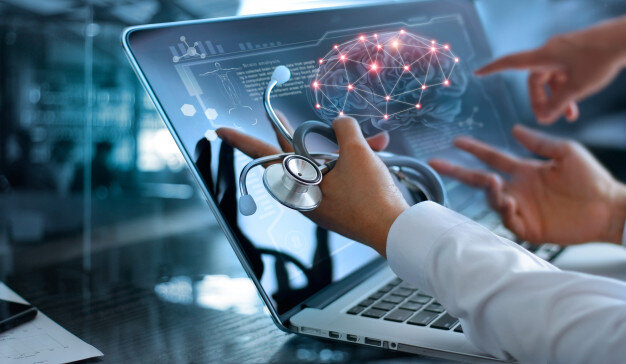AI in Action: How Machine Learning is Transforming Healthcare
Discover the groundbreaking impact of machine learning on the healthcare industry and how AI is revolutionizing patient care and medical research.
The Role of Machine Learning in Diagnostics
Machine learning plays a crucial role in diagnostics in the healthcare industry. With the help of advanced algorithms and data analysis, machine learning models can analyze large amounts of medical data and identify patterns and trends that may not be easily detectable by human doctors. This can greatly enhance the accuracy and speed of diagnosing various diseases and conditions.
By leveraging machine learning, healthcare professionals can benefit from improved decision-making and more precise diagnoses. Machine learning algorithms can process medical images, such as X-rays, MRIs, and CT scans, to identify abnormalities and assist in diagnosing conditions like cancer, cardiovascular diseases, and neurological disorders.
Additionally, machine learning can be used to predict the likelihood of certain diseases or conditions based on a patient's medical history, genetic information, and lifestyle factors. This can help healthcare providers take proactive measures to prevent diseases, personalize treatment plans, and improve patient outcomes.
Enhancing Treatment Plans with AI
AI, powered by machine learning, is revolutionizing treatment plans in healthcare. By analyzing vast amounts of patient data, AI algorithms can identify optimal treatment options and personalize healthcare plans for individual patients. This can lead to more effective and efficient treatments, reducing the risk of adverse events and improving patient outcomes.
Machine learning models can analyze patient data, including medical records, lab results, and genetic information, to identify patterns and correlations that can guide healthcare providers in selecting the most suitable treatment options. AI can also assist in predicting patient responses to specific treatments, enabling healthcare professionals to adjust and optimize treatment plans accordingly.
Furthermore, AI can support the development of new therapies and drugs by analyzing complex biological data and identifying potential targets for treatment. This can accelerate the discovery and development of innovative treatments for various diseases, ultimately benefiting patients worldwide.
Improving Patient Outcomes through Predictive Analytics
Predictive analytics, driven by machine learning, has the potential to significantly improve patient outcomes in healthcare. By analyzing large datasets and historical patient data, predictive analytics models can identify risk factors, predict disease progression, and recommend personalized interventions.
Machine learning algorithms can analyze patient data, including electronic health records, sensor data, and lifestyle information, to identify patterns and trends that can help predict the likelihood of certain diseases or conditions. This can enable healthcare providers to intervene early, provide preventive care, and reduce the burden of chronic diseases.
Moreover, predictive analytics can help healthcare professionals optimize resource allocation and healthcare delivery. By forecasting patient demand, predicting readmission rates, and identifying high-risk patients, healthcare providers can allocate resources effectively, improve patient flow, and enhance overall healthcare quality.
Empowering Healthcare Providers with Automation
Automation powered by AI and machine learning is transforming healthcare by empowering healthcare providers with efficient and streamlined processes. By automating repetitive and time-consuming tasks, healthcare professionals can focus more on patient care, reduce administrative burden, and improve operational efficiency.
Machine learning algorithms can automate tasks such as medical data entry, documentation, and administrative workflows, freeing up valuable time for healthcare providers to spend with patients. This can lead to improved patient satisfaction and better outcomes.
Furthermore, automation can enhance the accuracy and effectiveness of healthcare operations. AI-powered systems can assist in medical image analysis, flagging potential abnormalities for further review by healthcare professionals. Automation can also enable real-time monitoring of patient vital signs, alerting healthcare providers to any significant changes or potential emergencies.
Overall, automation in healthcare can enhance productivity, reduce errors, and improve the overall quality of care provided to patients.
Ethical Considerations in AI-driven Healthcare
As AI continues to revolutionize healthcare, it is essential to consider the ethical implications and ensure responsible use of these technologies. Ethical considerations in AI-driven healthcare include issues such as patient privacy, data security, transparency, and accountability.
Patient privacy and data security are crucial in healthcare, and AI systems must be designed to protect sensitive patient information. It is essential to establish robust data governance frameworks and adhere to strict privacy regulations to safeguard patient confidentiality.
Transparency and explainability are also important ethical considerations. Healthcare providers and AI developers should strive to make AI systems transparent and understandable to ensure trust and enable healthcare professionals to interpret and validate the results provided by AI algorithms.
Moreover, accountability is crucial when it comes to AI-driven healthcare. Healthcare providers should take responsibility for the decisions made based on AI recommendations and ensure that these decisions align with ethical standards and best practices.
By addressing these ethical considerations, AI-driven healthcare can maximize its potential while ensuring patient safety, privacy, and trust in the technology.



